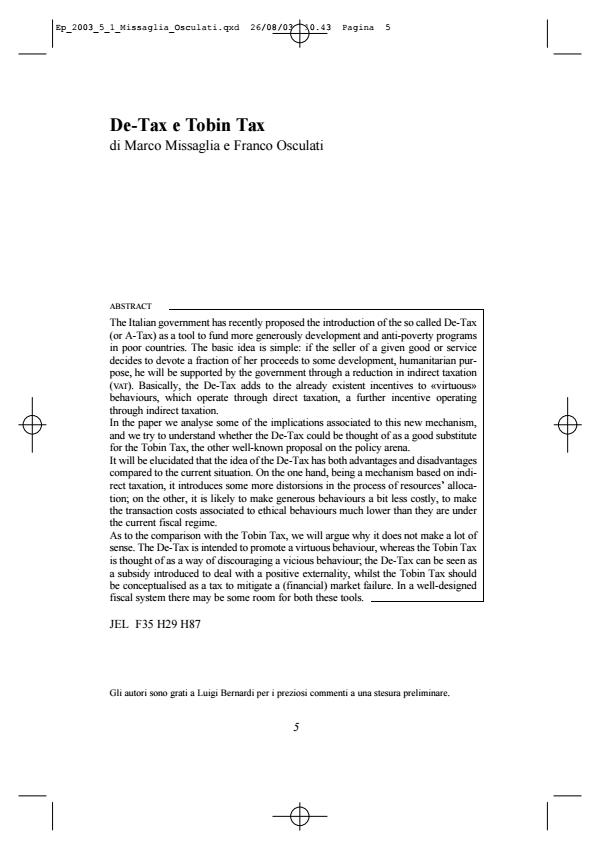De-Tax e Tobin Tax
Titolo Rivista ECONOMIA PUBBLICA
Autori/Curatori Marco Missaglia, Franco Osculati
Anno di pubblicazione 2003 Fascicolo 2003/5
Lingua Italiano Numero pagine 26 P. Dimensione file 136 KB
DOI
Il DOI è il codice a barre della proprietà intellettuale: per saperne di più
clicca qui
Qui sotto puoi vedere in anteprima la prima pagina di questo articolo.
Se questo articolo ti interessa, lo puoi acquistare (e scaricare in formato pdf) seguendo le facili indicazioni per acquistare il download credit. Acquista Download Credits per scaricare questo Articolo in formato PDF

FrancoAngeli è membro della Publishers International Linking Association, Inc (PILA), associazione indipendente e non profit per facilitare (attraverso i servizi tecnologici implementati da CrossRef.org) l’accesso degli studiosi ai contenuti digitali nelle pubblicazioni professionali e scientifiche.
The Italian government has recently proposed the introduction of the so called De-Tax (or A-Tax) as a tool to fund more enerously development and anti-poverty programs in poor countries. The basic idea is simple: if the seller of a given good or service decides to devote a fraction of her proceeds to some development, humanitarian purpose, he will be supported by the government through a reduction in indirect taxation (VAT). Basically, the De-Tax adds to the already existent incentives to «virtuous» behaviours, which operate through direct taxation, a further incentive operating through indirect taxation. In the paper we analyse some of the implications associated to this new mechanism, and we try to understand whether the De-Tax could be thought of as a good substitute for the Tobin Tax, the other well-known proposal on the policy arena. It will be elucidated that the idea of the De-Tax has both advantages and disadvantages compared to the current situation. On the one hand, being a mechanism based on indirect taxation, it introduces some more distorsions in the process of resources’ allocation; on the other, it is likely to make generous behaviours a bit less costly, to make the transaction costs associated to ethical behaviours much lower than they are under the current fiscal regime. As to the comparison with the Tobin Tax, we will argue why it does not make a lot of sense. The De-Tax is intended to promote a virtuous behaviour, whereas the Tobin Tax is thought of as a way of discouraging a vicious behaviour; the De-Tax can be seen as a subsidy introduced to deal with a positive externality, whilst the Tobin Tax should be conceptualised as a tax to mitigate a (financial) market failure. In a well-designed fiscal system there may be some room for both these tools.
Marco Missaglia, Franco Osculati, De-Tax e Tobin Tax in "ECONOMIA PUBBLICA " 5/2003, pp , DOI: